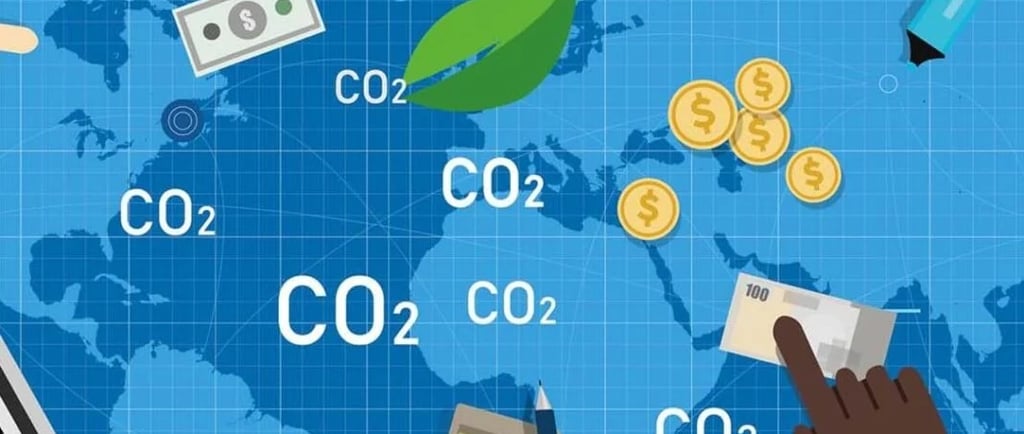Unlocking Green Gold: The Future of Carbon Markets in West Africa
Ahmed Gamal Elsayad, Political Science Researcher & Atef Mahmoud Dobal, Political Science Researcher
5/25/20254 min read


Climate change isn't a distant threat; for West Africa, it's a present reality, bringing significant environmental and economic challenges. But what if part of the solution could also fuel sustainable development? Enter carbon markets – an innovative tool that could help the region reduce greenhouse gas emissions, support clean energy, and create jobs, allwhile protecting our planet.
This isn't just wishful thinking. African Narratives study delves into the complex world of carbon markets, specifically examining their potential and pitfalls in West Africa. Let's unpack their findings.
What Exactly Are Carbon Markets?
At their core, carbon markets are trading systems for carbon credits. Think of it like this: governments or international bodies set limits (a "cap") on greenhouse gas emissions for certain industries or entities.
Companies that emit less than their allowance earn credits.
Companies that emit more than their allowance need to buy these credits to comply.
This creates a financial incentive to reduce emissions. The revenue generated can then be reinvested into green projects. These markets generally fall into two categories:
Mandatory Markets: Regulated by governments (like the EU's Emissions Trading System or California's Cap-and-Trade program), compelling industries to meet specific emission targets.
Voluntary Markets: Open to companies and individuals who want to voluntarily offset their emissions, often by investing in projects that avoid, reduce, or remove carbon from the atmosphere.
The underlying principle is powerful: one ton of greenhouse gas reduced has the same positive impact on the atmosphere, no matter where in the world that reduction happens.
West Africa's Journey: Potential Meets Reality
West Africa stands at a crucial juncture. The region is rich in natural resources, including vast forests, which could be leveraged to generate carbon credits and attract investment. Initiatives like the African Carbon Markets Initiative (ACMI), launched at COP27 and supported by the African Development Bank, signal a growing commitment. ACMI aims to dramatically increase carbon credit production across the continent, with an ambitious target of 300 million credits annually by 2030.
Countries like Togo are actively working to strengthen their carbon market mechanisms, and Nigeria is aiming to build a $2.5 billion carbon market. These are promising steps. However, the reality is that Africa currently accounts for only about 2% of the global carbon market. West Africa, despite its potential, is still in the very early stages of developing robust carbon markets.
The Hurdles: Why West Africa's Carbon Markets Are Lagging
The study by Elsayad and Dobal clearly identifies significant roadblocks:
Weak Infrastructure: Effective carbon markets need reliable systems for monitoring, reporting, and verifying emissions reductions. This includes registries to track credits and prevent double-counting. Many West African nations lack this foundational infrastructure. For example, Zambia’s past reforestation efforts struggled with establishing a system to monitor carbon balances, a challenge that could easily be mirrored in West Africa without targeted investment.
Lack of Clear Legislation: A clear, comprehensive legal framework is essential. Ambiguous regulations and unclear operational mechanisms erode investor confidence and make the market unattractive. Without robust legal backing, it's difficult to ensure credits are verified and that the market operates transparently.
Limited Funding and Human Resources: Developing and managing carbon markets requires significant financial investment and skilled personnel. In many West African countries, urgent development priorities often overshadow climate action initiatives. There's a scarcity of trained professionals who can navigate the complexities of carbon accounting, project development, and market management. The Congo Basin Forest Fund, for instance, faced financial shortfalls for forest conservation, highlighting the broader funding challenges.
These challenges don't exist in isolation. They intertwine, creating a complex barrier to progress. Without strategic planning and investment, the potential of carbon markets as an environmental and economic tool will remain largely untapped.
Paving the Way Forward: Solutions for a Thriving Market
So, how can West Africa overcome these obstacles and harness the power of carbon markets? The study offers clear recommendations:
Strengthen Governance: Good governance is the bedrock. This means:
Clear Roles & Accountability: Defining who does what and ensuring everyone is responsible for their part.
Participation: Including local communities and rights holders in decision-making to build support and ensure projects meet local needs.
Transparency: Making all project details – roles, costs, benefits – clear and accessible to build trust.
Equitable Benefit Sharing: Ensuring that the economic advantages are distributed fairly among all stakeholders.
Efficient Operations & Dispute Resolution: Streamlining processes and having clear ways to resolve conflicts.
Enhance Regional Cooperation: No country can do this alone. A "West African Carbon Market Alliance" could facilitate knowledge sharing, policy coordination, and collective bargaining power in global markets. Unified efforts can reduce costs and boost efficiency.
Invest in Infrastructure and Capacity: This means directing sustainable investments towards:
Developing robust monitoring, reporting, and verification (MRV) systems.
Building human capital through training programs for carbon market professionals.
Investing in renewable energy and carbon capture technologies to make green projects more viable.
Drawing lessons from successful international models, like those in the EU and California, can also provide valuable insights for tailoring approaches to the West African context.
An Urgent Necessity, Not Just an Option
Developing carbon markets in West Africa is more than just an economic opportunity; it's a critical step in tackling climate change and fostering genuine sustainable development. The path isn't easy, and the challenges are significant. Butwith strategic focus, regional collaboration, and robust governance, these markets can become a powerful engine for positive change.
By transforming environmental responsibility into an economic driver, West Africa can protect its precious natural resources, build resilience to climate impacts, and create a greener, more prosperous future for its people. The time to act is now.
Download the full study here.
Empowerment
Amplifying African voices for sustainable progress together.
Contact US
Growth
Street No. 3281, N'Djamena, Republic of Chad.
© 2024. All rights reserved.